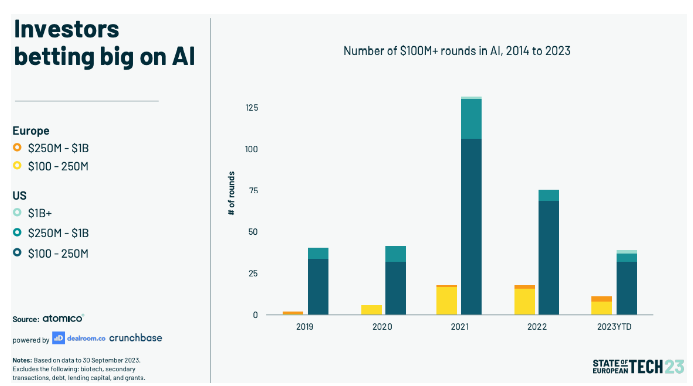Report Reveals: Europe Surpasses US in AI Talent Numbers
-
Europe's tech industry is experiencing a rebound, with artificial intelligence becoming the driving force behind the recovery. According to the latest research report from UK-based venture capital firm Atomico, Europe now boasts more highly skilled professionals than the US, marking several areas where Europe has surpassed the US in AI.
This achievement is built on a decade of rapid development. Over the past ten years, the number of professionals in Europe's AI sector has grown by an astonishing 1000%. AI companies have secured 11 out of 36 European funding rounds exceeding $100 million, including France's Mistral AI, which raised €105 million in the largest seed round in European history, and Aleph Alpha, which secured €460 million in a Series B funding round this month.
This influx of talent is fueling some impressive startups. In 2023, four of Europe's newly emerged unicorns are AI-focused: DeepL, Helsing.ai, Synthesia, and Quantexa. Their success has driven the recovery of Europe's ecosystem, bringing its total value to $3 trillion, matching the peak levels of 2021.
Tom Wehmeier, Head of Intelligence at Atomico, stated, "Since the pandemic, the European tech environment appears more stable than ever before." He believes this has brought more certainty, predictability, and confidence to the overall ecosystem.
AI is not the only sector in Europe with a rich talent pool. Despite a series of brutal layoffs earlier this year, the number of tech workers in Europe continues to show net growth, meaning new job creation has outpaced layoffs. Over the past five years, Europe's IT workforce has grown from 750,000 to over 2.3 million today.
One reason for this growth comes from across the Atlantic. According to Atomico's data, Europe is now a net beneficiary of US tech talent. "There has always been a perception that Europe sees a significant outflow of talent to the US," Wehmeier said. "But when you look at the data, it shows the opposite is true."
This influx of tech talent has sparked an explosive growth in new startups. This year, Europe is expected to produce around 14,000 new founders, 1,000 more than the US.

However, unfortunately, the current investor landscape in Europe does not match the ambitions of entrepreneurs. In the United States, startups are more likely to secure VC funding within their first five years, but once a company receives initial seed investment, their chances of reaching a billion-dollar valuation are comparable between Europe and the U.S.
As Atomico points out, funding a single company can have a generational impact, presenting a strong argument for better access to institutional investment. Skype serves as a powerful European example—its alumni network of entrepreneurs has founded over 900 companies across 50 countries, a phenomenon Atomico refers to as the 'flywheel effect.'
Wehmeier remarked, 'This is a surprising phenomenon that demonstrates the ability of a single company to shift the ecosystem.' Considering Europe has achieved 111 billion-dollar-plus exits in the past five years, you can truly sense the momentum with which this flywheel will continue to spin.
